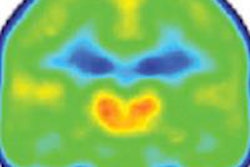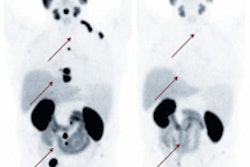Researchers from Yale University used a PET radiopharmaceutical based on carbon-11 (C-11) to measure an immune response in the brain that could be used in future research on neuroinflammation for pathologies such as Alzheimer's disease, according to research presented this week at the Society for Nuclear Medicine and Molecular Imaging annual meeting.
A research team led by Christine Sandiego, PhD, performed PET scans on eight healthy men using the radiopharmaceutical C-11 PBR28. The group performed two PET scans for each subject, one before and one after administration of lipopolysaccharide (LPS), an endotoxin derived from E. coli bacteria.
In the study, LPS was used to activate immune cells called microglia in the nervous system. The C-11 PBR28 radiotracer binds to proteins expressed on activated microglia, thereby allowing visualization of the neuroinflammation with PET.
Administering LPS led to a spike in the systemic inflammatory response and self-reported levels of sickness, and based on the PET scans, it activated microglia in the central nervous system, the researchers concluded.
The technique could shed light on the immune dysfunction that occurs in a range of neuroinflammatory diseases, such as Alzheimer's, depression, post-traumatic stress disorder, and addiction. Being able to accurately measure this immune response could contribute to new drug treatments, they noted.




















